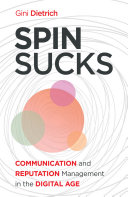

In the age of information, transparency has become a critical element for businesses. Consumers are more informed and connected than ever, making it essential for organizations to be open about their practices, values, and operations. Spin Sucks emphasizes that transparency builds trust, which is foundational for long-term relationships with customers and stakeholders. When companies are honest about their shortcomings and successes, they create a culture of authenticity that resonates with their audience. This idea encourages businesses to communicate openly and to avoid the pitfalls of deceptive marketing tactics that can lead to reputational damage. The author argues that transparency not only enhances credibility but also fosters a loyal customer base that appreciates genuine engagement.
Continue readingEthical communication is a central theme in Spin Sucks, where the author argues for the necessity of integrity in messaging. The book highlights that ethical communication goes beyond mere compliance with regulations; it involves a commitment to honesty and respect in all interactions. The author illustrates how ethical communication can differentiate a brand in a crowded marketplace. By prioritizing ethical standards, businesses can avoid the negative consequences of spin—misleading or manipulative communication that can erode trust. The narrative stresses that ethical communication not only enhances brand reputation but also contributes to a positive organizational culture, where employees feel valued and empowered to speak truthfully.
Continue readingSpin Sucks delves into the significance of content marketing as an effective strategy for engaging audiences. The book argues that content marketing is not just a trend but a fundamental approach to building relationships with customers. By providing valuable, relevant content, brands can establish themselves as thought leaders in their industries. The author emphasizes the need for a well-defined content strategy that aligns with business goals and audience needs. This involves creating a mix of content types—blogs, videos, podcasts—that resonate with different segments of the audience. The narrative also highlights the importance of measuring the effectiveness of content marketing efforts to refine strategies and ensure that they are meeting the desired objectives.
Continue readingSocial media has transformed the landscape of communication, and Spin Sucks explores its powerful role in shaping public perception. The author discusses how social media platforms provide businesses with direct access to their audience, allowing for real-time engagement and feedback. This immediacy presents both opportunities and challenges; while brands can quickly address customer concerns, they must also navigate the potential for negative publicity. The book advises companies to adopt a proactive approach to social media management, emphasizing the importance of listening to audiences and responding authentically. By leveraging social media effectively, organizations can enhance their visibility, foster community, and build stronger relationships with customers.
Continue readingCrisis management is a critical aspect of maintaining a brand's reputation, and Spin Sucks offers insights into effective strategies for navigating crises. The author emphasizes that every organization will face challenges that could threaten its reputation. The key to successful crisis management lies in preparation and responsiveness. The book outlines a framework for developing a crisis communication plan that includes identifying potential risks, establishing clear communication channels, and training employees on how to respond. Additionally, the narrative stresses the importance of transparency and accountability during a crisis, as these elements can significantly influence public perception. By adopting a proactive stance, organizations can mitigate damage and recover more swiftly from reputational setbacks.
Continue readingSpin Sucks provides a comprehensive look at the evolution of public relations in the digital age. The author discusses how traditional PR practices have been transformed by technological advancements and changing consumer behaviors. The book argues that modern PR requires a multifaceted approach that integrates digital strategies, content marketing, and social media engagement. The narrative highlights the shift from one-way communication to interactive dialogue, where audiences expect to participate in conversations about brands. This evolution necessitates that PR professionals adapt their skills and strategies to remain relevant and effective in engaging their target audiences.
Continue readingThe book concludes with a focus on the importance of organizational culture in achieving communication goals. Spin Sucks posits that a strong culture of openness and collaboration is essential for effective communication both internally and externally. The author argues that when employees feel empowered and aligned with the company's values, they are more likely to act as brand ambassadors. This alignment fosters a sense of ownership and accountability, which can enhance overall organizational performance. The narrative encourages leaders to prioritize culture-building initiatives that promote transparency, ethical behavior, and effective communication practices.
Continue readingThe reading time for Spin Sucks depends on the reader's pace. However, this concise book summary covers the 7 key ideas from Spin Sucks, allowing you to quickly understand the main concepts, insights, and practical applications in around 20 min.
Spin Sucks is definitely worth reading. The book covers essential topics including The Importance of Transparency, The Role of Ethical Communication, Content Marketing as a Strategy, providing practical insights and actionable advice. Whether you read the full book or our concise summary, Spin Sucks delivers valuable knowledge that can help you improve your understanding and apply these concepts in your personal or professional life.
Spin Sucks was written by Gini Dietrich.
If you enjoyed Spin Sucks by Gini Dietrich and want to explore similar topics or deepen your understanding, we highly recommend these related book summaries:
These books cover related themes, complementary concepts, and will help you build upon the knowledge gained from Spin Sucks. Each of these summaries provides concise insights that can further enhance your understanding and practical application of the ideas presented in Spin Sucks.